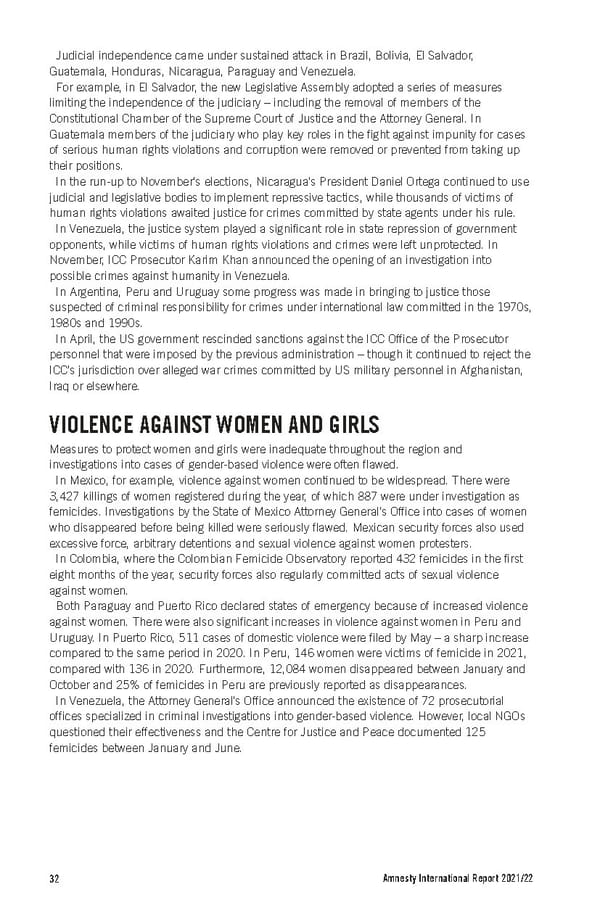Judicial independence came under sustained attack in Brazil, Bolivia, El Salvador, Guatemala, Honduras, Nicaragua, Paraguay and Venezuela. For example, in El Salvador, the new Legislative Assembly adopted a series of measures limiting the independence of the judiciary – including the removal of members of the Constitutional Chamber of the Supreme Court of Justice and the Attorney General. In Guatemala members of the judiciary who play key roles in the fight against impunity for cases of serious human rights violations and corruption were removed or prevented from taking up their positions. In the run-up to November’s elections, Nicaragua’s President Daniel Ortega continued to use judicial and legislative bodies to implement repressive tactics, while thousands of victims of human rights violations awaited justice for crimes committed by state agents under his rule. In Venezuela, the justice system played a significant role in state repression of government opponents, while victims of human rights violations and crimes were left unprotected. In November, ICC Prosecutor Karim Khan announced the opening of an investigation into possible crimes against humanity in Venezuela. In Argentina, Peru and Uruguay some progress was made in bringing to justice those suspected of criminal responsibility for crimes under international law committed in the 1970s, 1980s and 1990s. In April, the US government rescinded sanctions against the ICC Office of the Prosecutor personnel that were imposed by the previous administration – though it continued to reject the ICC’s jurisdiction over alleged war crimes committed by US military personnel in Afghanistan, Iraq or elsewhere. VIOLENCE AGAINST WOMEN AND GIRLS Measures to protect women and girls were inadequate throughout the region and investigations into cases of gender-based violence were often flawed. In Mexico, for example, violence against women continued to be widespread. There were 3,427 killings of women registered during the year, of which 887 were under investigation as femicides. Investigations by the State of Mexico Attorney General’s Office into cases of women who disappeared before being killed were seriously flawed. Mexican security forces also used excessive force, arbitrary detentions and sexual violence against women protesters. In Colombia, where the Colombian Femicide Observatory reported 432 femicides in the first eight months of the year, security forces also regularly committed acts of sexual violence against women. Both Paraguay and Puerto Rico declared states of emergency because of increased violence against women. There were also significant increases in violence against women in Peru and Uruguay. In Puerto Rico, 511 cases of domestic violence were filed by May – a sharp increase compared to the same period in 2020. In Peru, 146 women were victims of femicide in 2021, compared with 136 in 2020. Furthermore, 12,084 women disappeared between January and October and 25% of femicides in Peru are previously reported as disappearances. In Venezuela, the Attorney General’s Office announced the existence of 72 prosecutorial offices specialized in criminal investigations into gender-based violence. However, local NGOs questioned their effectiveness and the Centre for Justice and Peace documented 125 femicides between January and June. Amnesty International Report 2021/22 32
 Amnesty International Report 2021/22 Page 31 Page 33
Amnesty International Report 2021/22 Page 31 Page 33